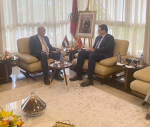You are here
Jordan needs a major shift in its political life
Oct 12,2021 - Last updated at Oct 12,2021
Three months after it was formed, Jordan’s royal-appointed Committee on Modernising the Political System delivered its recommendations to King Abdullah last week. The 92-member committee, comprised of public figures representing various political, social and economic streams, was given the task of submitting drafts for new elections and political party laws in addition to proposals to empower women and youth and improve local administration.
The royal initiative came after years of public demands for major political reforms amid a stale political environment. The king had presented his vision for political reforms through a series of discussion papers following the Arab Spring. He called for a gradual transformation towards parliamentary governments where political parties compete for public confidence to run the executive branch as an alternative to appointed governments.
A week after the committee delivered its proposals Prime Minister Bisher Al Khasawneh reshuffled his cabinet for the fourth time since he was appointed a year ago. The reshuffle did not impress the street which had become skeptical of the government’s performance and its ability to deliver meaningful results that can improve the daily livelihood of millions of Jordanians. Since 2019 unemployment and poverty rates had risen to record levels while the national debt had crossed the $45 billion mark; more than 90 per cent of the GDP. It is expected to pass the 100 per cent mark in 2022.
Between 2011 and now Jordan had six governments and all had royal mandates to improve the economy and the livelihood of Jordanians. While the pandemic had negative influence on the economy in general the reality is that no single government was able to change the downward trajectory of the national economy. With the unemployment rate standing at more than 25 per cent, it is much higher among youth and women, it has become an alarming socioeconomic indicator.
Activists and political parties blame the single vote system, adopted in the mid 1990s to restrain the Islamists, for the decay that has infected the political life in the kingdom. After more than two decades of parliamentary elections held under this system and its variations, a majority of Jordanians have lost faith in successive legislatures and the ability of elected lawmakers to perform their oversight duty or to introduce genuine reforms. Political parties, now numbering over 50, have failed to either win seats or form blocs, with the exception of the Islamic Action Front (IAF) and its allies.
The outcome resulted in the marginalisation of political parties, the gross encroachment of the executive branch at the expense of the legislative as well as the judiciary, the explosive rise of sub-identities at the expense of a uniting national identity and the influence of the so-called black money on voters. It is no wonder that over 70 per cent of Jordanians no longer trust their deputies and that voter turnout in last year’s elections was less than 30 per cent.
Activists and political figures have talked about the lack of political will to change the political status quo and introduce genuine reforms. But now there is royal commitment to pass the two laws that the committee had proposed. The general aim of the two laws is to enable and empower political parties incrementally and over a period that may take at least 12 years so that the Kingdom may one day be governed by elected parliamentary governments. It is an understatement to say that Jordanians have been waiting for such a development for more than 30 years. The democratic transition or transition to democracy as it was once called was delayed under different pretences; the most common was that Jordanians were not mature enough to govern themselves.
But the track record of previous appointed governments is dismal in almost all fields. Jordanians have become fed up with revelations of corruption in the public sector, mismanagement of public resources, declining public services and dilapidated infrastructure. A huge gap has emerged separating citizens from governments and lawmakers. This lack of trust has become a common trans-governmental denominator and an anathema to incoming prime ministers.
The problem for the new pieces of legislation proposed by the royal committee is that they come too late to make any difference. Aside from some legislative obstacles, political parties need to pass a threshold of 2.5 per cent of total votes under a proportional system and the need to find 1,000 founding members to form a political party, the majority of Jordanians have become apolitical. Most existing political parties are non-ideological and have vague programs. Ironically, past governments fought to suppress an emerging secular and civil rights party. It is almost impossible for a political party to attract enough voters although the fact those parties will run under a single national district, to contest 41 seats of a 130-seat Lower House, may begin to heal the kingdom from the scourge of sub-identities and black money.
One positive achievement by the committee was its focus, in the report’s preface, on national identity regardless of origin, an issue that is divisive and controversial, and the rule of law. One issue remains central and that is that Jordan needs a major shift in its political life that goes beyond modernisation and tackles the main challenge of fair separation of powers and people’s right to govern themselves as spelled outright in the Constitution.
Osama Al Sharif is a journalist and political commentator based in Amman













